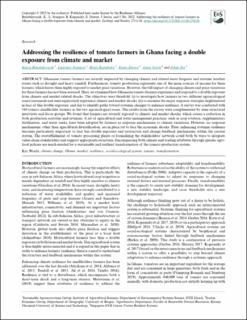| dc.description.abstract | Ghanaian tomato farmers are severely impacted by changing climate and related more frequent and extreme weather events such as drought and heavy rainfall. Furthermore, tomato production represents one of the main sources of income for these farmers, which leaves them highly exposed to market price variations. However, the full impact of changing climate and price variations for these farmers has not been assessed. Here, we examined how Ghanaian tomato farmers experience and respond to a double exposure from climate and market related shocks. The objectives were threefold: (i) to investigate how farmers in two different agroecological zones (savannah and semi-equatorial) experience climate and market shocks, (ii) to examine the major response strategies implemented in face of this double exposure, and (iii) to identify paths toward systemic changes to enhance resilience. A survey was conducted with 344 tomato smallholder farmers in the two agroecological zones. The results from the survey were complemented by semi-structured interviews and focus groups. We found that farmers are severely exposed to climate and market shocks, which causes a reduction in both production activities and revenues. A set of agricultural and water management practices, such as crop rotation, supplementary fertilization, and water tanks, have been adopted by farmers as response mechanisms to climate variations. However, no response mechanisms, other than agricultural diversification, are in place yet to face the economic shocks. Thus, enhancing systemic resilience becomes particularly important to face this double exposure and restructure and change feedback mechanisms within the current system. The reestablishment of tomato processing plants or formalizing the stakeholders’ network could both be ways to integrate value-chain stakeholders and support appropriate structures. Encompassing both climate and trading attributes through specific agro-food policies are much-needed for a sustainable and resilient transformation of the tomato production system. | en_US |

